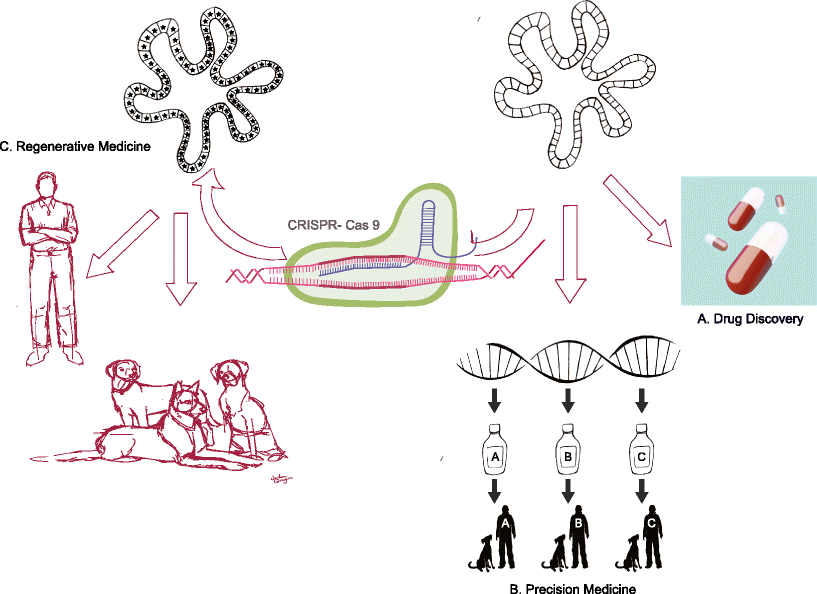Video & Blog: What Physicians Don't Understand about Obesity, Canine Cancer Liquid Biopsy, Intestinal Organoids
Dr. Ernie Ward
Zomedica is Developing Canine Cancer Liquid Biopsy
Our first story is an exciting development in the war against cancer.
Zomedica, a veterinary pharmaceutical and diagnostics company, has officially partnered with Celsee, a developer of circulating tumor cell isolation technology. The two Michigan-based companies have agreed to develop and commercialize a liquid biopsy test for canine cancer. This test identifies circulating tumor cells (CTC's) that have shed from a tumor and are circulating throughout the body. These tests can be used to identify cancer in its earliest stages and to determine if a patient is coming out of remission. The commercially available human version of this test delivers results within four hours. Zomedica hopes to finalize validation of this technology in early 2018 and bring it to market by late 2018.
As a veterinary clinician, I'm constantly seeking ways to identify disease in my patients as early as possible. This test holds tremendous potential and I'm really excited to see Zomedica moving in this direction.
Canine Intestinal Stem Cell Organoids Promise Translational Medicine Applications
In other high tech diagnostic news, the Journal of the American Association of Pharmaceutical Scientists recently published a commentary on the translational value of intestinal stem cell organoids in dogs and humans. Organoids were first developed by scientists at Stanford University and in the Netherlands in 2009 and 2010. In just a few years, scientists have been able to organize these stem cell lines into clusters that may mimic organ functions.
This paper focused on the use of intestinal stem cell line organoids to look at diseases like colon cancer and inflammatory bowel disease (IBD) in dogs and how they translate to humans.
Dogs May Be Better Translational Study Models than Mice
Over the past decade, many scientists have become concerned that traditional mouse models aren't ideal when it comes to translating drug and therapies to humans. A closer analog may be man's best friend. Canine disease translational medicine models also may share similar environmental, genomic, anatomical, and intestinal characteristics with humans that make them an attractive study model for human disease.
These organoids are also being applied to the “organ on a chip” or microfluidic chips to study how entire organ systems, such as the intestinal tract, operate in vivo.
Organoids and Microfluidic Chips May Replace Live Animal Research
Perhaps the most exciting use of organoids in microfluidic chips in research use, at least for me, is the fact that we may be able to use these emerging technologies to eliminate live animal research models. In addition to eliminating the use of live animals in research, these technologies may also allow more precision and specificity in medical studies. Stay tuned to these exciting developments in research, because I think they have tremendous potential to help both animals and humans.
What Physicians Don’t Understand about Obesity
Finally, a new study shows that primary care physicians may not understand obesity as well as we'd like.
In a study co-authored by my friend and mentor, Ted Kyle of the Obesity Action Coalition, researchers surveyed physicians attending both general medical conferences and obesity treatment conferences. The study revealed that primary care physicians believe that behavioral factors influenced the development of obesity and treatment more than biological factors or medical and surgical interventions.
Obesity medicine expert Dr. David Arterburn commented about the study on Twitter:
“Primary care physicians (PCP’s) ranked bariatric surgery as less effective than behavior modification for the treatment of obesity. Have they read the literature? Both are effective, but behavior change has never won a head to head comparison. Important study.”
Kyle and his colleagues were quick to point out in the study that behavior modification has a place and is important in the treatment and management of obesity. But the medical and scientific evidence is clear: Bariatric surgery and medical interventions far exceed behavioral modification alone.
Human and Pet Obesity Intersection
When it comes to the treatment of pet obesity, I find many veterinarians may blame the owner for a “lazy lifestyle” or simply overfeeding. While these behaviors certainly contribute to overweight and obesity in animals, they aren't the only element to blame.
I believe that pet obesity is a multifactorial disease and must be treated as such. If veterinarians simply dismiss pet obesity as a “byproduct of overfeeding and under-exercising,” I fear we will miss the opportunity to discover and investigate the underlying physiological mechanisms involved.
This research on our human medical counterparts demonstrates that we have a long way to go in the treatment of obesity, both in animals and in humans.
What do you think, Off Labelers? Do you view pet obesity as a disease? Why or why not? What do you think about primary care physicians’ belief that behavior beats biology when it comes to obesity?






